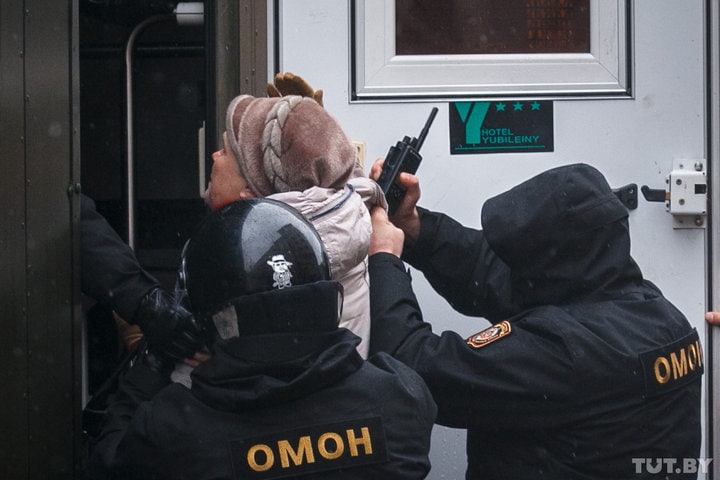Belarus is experiencing social and political unrest. Street protests against President Alexander Lukashenko erupted in late February and continued in March, as a reaction to the newly introduced "tax on parasitism" (a tax amounting to 14,000 rubles that non-working citizens and foreigners with permanent residence must pay,). The tax's introduction triggered mass peaceful protests, which the authorities did not curbimmediately. Belarus President Alexander Lukashenko was forced to postpone implementation of the tax that would have affected around 8% of the working population.[1]
On March 25, a rally took place in Minsk, on the occasion of 1918's proclamation of the Independent State of Belarus, known as "Freedom Day". The day before the street rally the city administration issued a warning that no street rallies had been authorized. However, anti-government protesters took part to the unauthorized march. According to independent outlets the police arrested hundreds of anti-government protesters throughout the country. In Minsk, over 400 people were detained.[2] Belarusian opposition leader, poet, and 2010 presidential candidate, Vladimir Neklyayev, a protest organizer, was also detained by law enforcement agencies.[3]
The Belarus media outlet Belarus Digest, which is published by academics based in Belarus and the EU, reported that few days before the Freedom day march, Belarus President Alexander Lukashenko said that the authorities arrested armed fighters, who were planning to overthrow the government on 25 March. Belarus Digest reported: "The fighters allegedly had training camps inside Belarus and in neighboring countries. The official media also reported on a series of related incidents, such as gunmen in a car attempting to force their way through a border checkpoint in Ukraine." While some observers claimed that the threats were fabricated by a pro-Russian faction within the Belarusian security services and Lukashenko had been duped, others claimed that Lukashenko, who is wary of any mass protests, opportunistically exploited the story to justify renewed repression."[4]
Commenting on the protests and on the news of an alleged plan of a coup, Lukashenko said: "There are some people bent on blowing up the situation in the country. I call them the fifth column. They are not an opposition... I am concerned about an increase in activity of the fifth column in Belarus… The fifth column and some other people are eager to stir up trouble in Belarus… You should remember that there are thousands of provocation specialists like that in the world. They are certainly controlled by the special services of certain countries." According to Lukashenko, some parties consider that Belarus is ripe for a Ukraine or Georgia style color revolution. The Belarus President added: "Some [foreign] parties saw that there is a demand for provocateurs in Belarus. An investigation will clear up things now. A criminal case has been opened. They have been trying to break into our territory using various means. It happened more than once and not only in 2017. They have been trying to smuggle pistols, machine guns or grenades into Belarus all the time."[5]
On the eve of "Freedom Day", Lukashenko stated: "The Ukrainian situation in Belarus is not mine… I cannot allow that the Ukraine-like conflict could be staged in Belarus."[6]
According to the Belarusian blogger Yuriy Drakokhrust, The crackdown following a modest liberalization in the past year and a half was occasioned by the authorities' apprehension that the extended economic slump coupled with price hikes for essential services could trigger mass demonstrations as opposed to the demonstrations that gathered around a hundred participants. The authorities extrapolated the size of demonstrations a month, half a year and a year down the road and conjured up visions of the Ukranian Maidan protest or Cairo's Tahrir Square that brought down the regime. They therefore applied brutal force. The protests have demonstrated that resentment has accumulated in broad sectors of society and are no longer restricted to the "creative class".[7]
On March 26, the low scale protests in Minsk continued. According to press reports dozens of participants were detained, after police warned that the protests were unauthorized.[8]
Russian columnist Vladimir Bychkov insinuated in the Russian news agency Ria.ru that that the social unrest in Belarus was inspired by the American USAID agency. According to the columnist, the agency published a grant for independent Belarusian media immediately in advance of the planned protests. According to Bychkov, who refers to unidentified experts, USAID centers abroad are dedicated to establishing centers of influence in countries targeted by the US security services. The American grants were a repetition of the strategy that the U.S. employed to lay the groundwork for the revolution in Ukraine and the protests were a promo for bigger and better things..[9]
Below is an article published in the Belarus Digest, discussing why the Belarus authorities resorted to violence against peaceful protestors on March 25:[10]

(Source: Tut.by)
'The Worse The Human Rights Situation In Belarus… The Closer The Country Gets To Russia
"Following the violent suppression of peaceful political protests in Belarus, many policy-makers in Western capitals are at a loss. Should they re-impose sanctions? Ignore human rights violations for geopolitical concerns? To resolve this quagmire, it is important to understand why the Belarusian authorities have resorted to violence.
SUPPORT OUR WORK

"Although no one doubts Lukashenko's willingness to resort to violence against peaceful protestors, expert opinion differs over why exactly he chose violence this March. Some say it is simply the logic of fear. Over the past several years, the authorities have refrained from resorting to large-scale violence. Unsanctioned opposition protests were monitored, but violence was not used until last Saturday [March 25, 2017].
"One thing seems clear - the authorities want to deter future protests. Their hope is that a harsh reaction to a small protest will make people think twice before protesting again. Although the total number of people participating in 'social parasite protests' throughout Belarus was lower than many opposition demonstrations of the past, their spread to the regions and the participation of a previously apolitical segment of the population has scared the authorities. The reaction of the authorities has so far been softer than in December 2010. But with hundreds of people detained, the brutal beatings of opposition activists it approaches the worst periods of the Lukashenko's rule… The peak of the crackdown occurred during the Freedom Day celebration organized by the opposition, rather than the more spontaneous 'social parasites protests' earlier this month. In this way, the authorities demonstrated their intolerance of the organized opposition while proving their loyalty to Russia and its anti-Western, anti-Maidan course.
"Some blame the brutality on the efforts of pro-Russian elements in certain law enforcement bodies, who are interested in spoiling the gradually improving relations between the West and Belarus. According to this logic, the worse the human rights situation in Belarus, the more power police have and the closer the country gets to Russia. Some pundits even suggested that Belarusian riot police officers dream of Russian salaries, which are much higher. Some voices argue that it is Lukashenko’s son Viktor who is trying to prove himself as a tough leader. However, as in 2010, the lack of any conclusive evidence means that all such theories are highly speculative.
'Political Survival… Is Behind The Actions Of The Belarusian Authorities'
"The main strategic goal of the Belarusian leadership is to remain in power. In the absence of real elections, they face two existential threats. First, the threat of domestic revolt, which looks very real given the revolutions in Ukraine and the ousting of President Viktor Yanukovich. The rapidly declining economy, growing unemployment, and political intolerance in Belarus contribute to this scenario.
"The second threat is open or covert interference from Russia. Russia has enormous influence among the Belarusian law enforcement agencies (siloviki), in the country’s economy, and in its media sphere. To appease Russia, Belarusian authorities like to emphasize that Belarus is Russia’s only real ally to the West of its borders. But economic pressure from Russia, pressure to host a military air base, and Russian interference in countries stretching from Ukraine, Moldova, Montenegro to the United States cannot be entirely dismissed by the authorities.
"In the minds of the Belarusian leadership, improving relations with the West can only mean political liberalization and a higher likelihood of a domestic revolt scenario. Moreover, Russia is jealously watching any pro-Western overture from Lukashenka, thus strengthening the second scenario. For example, Russia promptly reacted to measures such as the introduction of visa-free access of Western nationals to Belarus by imposing border controls with Belarus.
"Political survival, rather than the well-being of the population, is behind the actions of the Belarusian authorities. Any improvement in relations with the West may bring some short-term benefits, but in the long-run, this would simply worsen the two main existential threats. Moreover, playing the anti-western game and suppressing demonstrations plays well in Russia, which is the main geopolitical sponsor of the Belarusian political regime.
'Any Optimism About Serious Improvements In Belarusian-Western Relations Is Misplaced'
"Given these two existential threats, any optimism about serious improvements in Belarusian-Western relations is misplaced. Without unrealistic expectations, the European Union should clearly delineate those areas of cooperation contingent upon improvement of the human rights situation, and those which should be pursued in any event.
"The European Union will be under pressure to react to the recent human rights violations by remaining faithful to its values. However, because EU leverage in Belarus is very weak, the menu of responses is largely limited to reintroducing of restrictive measures and reducing high-level official contacts with Lukashenko and the handpicked parliament.
"On the other hand, visa liberalization, support for Belarusian civil society, education, media, and entrepreneurs should at least continue to receive support. These projects primarily benefit the Belarusian population, which is already in a very difficult situation: deprived of many human rights and struggling to make ends meet. At the same time, other projects with the Belarusian authorities could be revised or put on hold.
"In the short-term, it will be important to see whether the authorities will release all those detained in March, including those arrested on bogus charges of plotting an armed 'putsch'. If the days of long-term political prisoners return to Belarus, the country will most likely see yet another sanctions-engagement cycle with the West."
[1] Meduza.io, March 9, 2017.
[2] News.tut.by, March 25, 2017; Telegraph.co.uk, March 25, 2017
[3] Tass.com, March 25, 2017.
[4] Belarusdigest.com, March 25, 2017.
[5] Eng.belta.by, March 21, 2017.
[6] Tass.com, March 24, 2017.
[7] News.tut.by, March 25, 2017.
[8] News.tut.by, March 26, 2017.
[9] Ria.ru, March 21, 2017.
[10] Belarusdigest.com, March 27, 2017.




